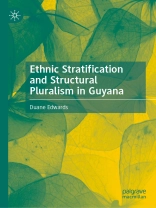Through a case study of Guyana, a society in which structural pluralism and ethnic/racial divisions coincide to a large extent, this book explores the specific way in which social structures interact with and affect social institutions, ethnic stratification, social actions, and both group-based and purportedly universalist ideologies. The book examines how a system of differentiation and stratification, inherited from colonial times, persists in its essential form in the current time despite attempts to dislodge it. While not falling prey to a structural determinism, the book argues, based on the evidence provided through both a historical sociological review of historical evidence and a presentist analysis of cross-sectional data on business ownership, that actions which coincide with the logic of social structures tend to prevail over actions which take that logic for granted. It is for this reason that political and social players with grand ideals have been less successful in their attempts to bridge the social and economic divides in the country, than those players whose interests coincided with the structural divides.
Содержание
1. Introduction.- 2. Structural Pluralism in Guyana.- 3. Historical Evolution of Social Differentiation and Stratification.- 4. The Role of Social Structures.- 5. Role of Institutions.- 6. The Role of Ideology.- 7. Conclusion.
Об авторе
Duane Edwards is a Senior Lecturer in the Department of Sociology at the University of Guyana. He lectures both undergraduate and graduate courses in social theory and social research.












